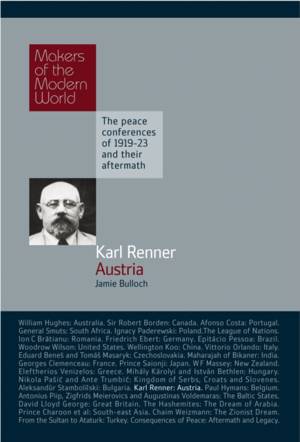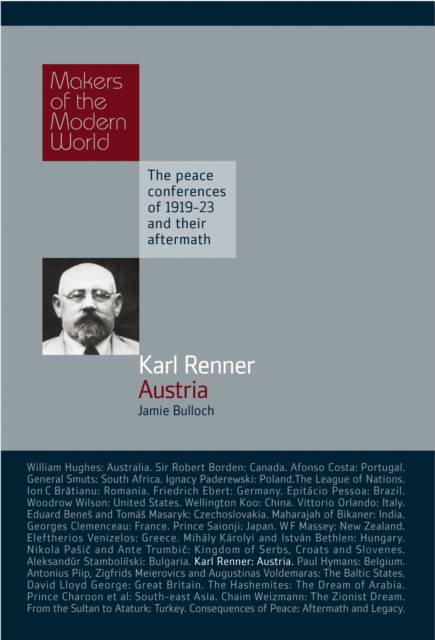
Bedankt voor het vertrouwen het afgelopen jaar! Om jou te bedanken bieden we GRATIS verzending (in België) aan op alles gedurende de hele maand januari.
- Afhalen na 1 uur in een winkel met voorraad
- In januari gratis thuislevering in België
- Ruim aanbod met 7 miljoen producten
Bedankt voor het vertrouwen het afgelopen jaar! Om jou te bedanken bieden we GRATIS verzending (in België) aan op alles gedurende de hele maand januari.
- Afhalen na 1 uur in een winkel met voorraad
- In januari gratis thuislevering in België
- Ruim aanbod met 7 miljoen producten
Zoeken
€ 18,45
+ 36 punten
Omschrijving
The Socialist politician Karl Renner (1870-1950) was prime minister of the government that took power in Vienna after the collapse of the Austro-Hungarian Empire. He lead the delegation to Paris, which had to face the difficult issue of reparations and war guilt, for which the Allies held the successor states to the Empire responsible for. Fortunately, Renner was a likeable man and a realist, and the Austrian delegation became quite popular in Paris. The new Austrian state was in a perilous condition in 1919, on the brink of starvation and revolution, and facing territorial demands from both Italy, which had its eyes on the Tyrol, and the new Yugoslavia. Many in the German-speaking rump of the Empire sought union with Germany, Anschluss, but the Allied Powers vetoed it. Austria is often overlooked as one of the successor states to the Habsburg Empire, but it was no less important in the postwar settlement than Hungary, Czechoslovakia and the Balkan countries. Jamie Bulloch's account of Karl Renner's adroit handling of a difficult situation makes for fascinating reading.
Specificaties
Betrokkenen
- Auteur(s):
- Uitgeverij:
Inhoud
- Aantal bladzijden:
- 224
- Taal:
- Engels
- Reeks:
Eigenschappen
- Productcode (EAN):
- 9781905791897
- Verschijningsdatum:
- 4/01/2011
- Uitvoering:
- Hardcover
- Formaat:
- Ongenaaid / garenloos gebonden
- Afmetingen:
- 135 mm x 206 mm
- Gewicht:
- 399 g

Alleen bij Standaard Boekhandel
+ 36 punten op je klantenkaart van Standaard Boekhandel
Beoordelingen
We publiceren alleen reviews die voldoen aan de voorwaarden voor reviews. Bekijk onze voorwaarden voor reviews.









